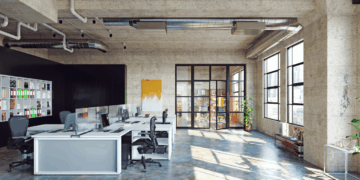- A recently released study found that 60% of workers would take a lower paid job if it had a healthier working environment than their current job, and 42% said unpleasant odors created a stressful and anxious work environment.
- Pleasant fragrances can reduce stress, enhance moods, improve productivity on the job, and connect people with nature.
- Ambient scenting technology for office spaces can be computer controlled, efficient, hypoallergenic, and use sophisticated odor-neutralizing technology to take out unwanted odors on a molecular level.
In a post-pandemic world with Americans spending approximately 90 percent of their time indoors, sanitization and air quality are now at the forefront of minds for coworking space companies. And while all are embracing extensive cleaning measures, there’s one sense that is often over-looked, yet right under our very nose.
People can’t see clean — but they can smell it.
“93% of people say that a bad odor will negatively affect their impression of an organization, and more than half of individuals will assume a property is dirty if it doesn’t smell good, so people are thinking about cleanliness in a totally different way,” says Rene Merino, who manages a coworking space called The Warehouse in New Orleans, LA. “That’s why we wanted a crisp, clean smell, to give people a sense that when they’re walking in here, they’re safe.” His facility was wrestling with an odor issue from the adjacent restaurant’s trash rooms. The lingering malodors left his community with a sour taste in their mouth — and nose.
With a goal to create an added sense of reassurance, Merino sought out global ambient scent provider, Prolitec. This industry giant provides not only sustainably sourced fragrances, but also full-service to customers in more than 80 countries. Their technology is computer controlled, efficient, hypoallergenic, and their proprietary fragrances use sophisticated odor-neutralizing technology to take out unwanted odors on a molecular level.
“The added value that not only do people work in a clean place, but they feel they are working in a clean place, is priceless,” says Merino.
Yet the perception of clean and feeling of security in returning to workplaces is only half the battle. People are now developing a keener interest in the concept of wellness, and companies are taking notice as that growing appetite for wellness in indoor spaces is a global trend.
Smarter Working is an initiative headquartered in Belgium that has launched the EASI framework. EASI is an acronym for “Energize Author Share Interact.” The platform provides actionable guidance on how to improve worker productivity and health. It covers how spaces can best support conditions such as air, temperature, light, sound, movement, materials, and technology.
“The concept of wellness is now firmly a boardroom matter,” says Philip and Jan Vanhoutte, founders of the EASI concept. “The need is highlighted by Leesman, the leading Workplace Satisfaction survey that shows that many wellbeing facets rate very poorly (on a scale of 100) — air quality not much better at 45%.”
The study is backed by other industry experts and research. Ambius, a division of Rentokil North America and a leading provider of ambient scent under their Premium Scenting brand, recently released a study that found that 60% of workers would take a lower paid job if it had a healthier working environment than their current job and 42% said unpleasant odors created a stressful and anxious work environment.
“It’s all about the experience,” says Merino. “Scent adds another dimension to our tenant and visitor’s experience and (pardon the pun), it absolutely makes scents.”
“Pleasant fragrances lift moods, positively influence emotions, and connect people with nature” add the Vanhouttes of Smarter Working.
“Fragrances are effective at reducing stress, enhancing moods, and improving productivity on the job,” Mattioli of Giant Enterprises says about the benefits of scents.
The consensus is clear: scent is playing a growing role in the world of facilities management. People are returning to public spaces with a shifted perspective. They expect clean, they expect welcoming, and they expect wellness. Businesses across all industries can leverage ambient scent to meet these expectations.
As the Vanhouttes sum things up for the coworking industry, “Scent is increasingly a need, rather than a luxury.”



 Dr. Gleb Tsipursky – The Office Whisperer
Dr. Gleb Tsipursky – The Office Whisperer Nirit Cohen – WorkFutures
Nirit Cohen – WorkFutures Angela Howard – Culture Expert
Angela Howard – Culture Expert Drew Jones – Design & Innovation
Drew Jones – Design & Innovation Jonathan Price – CRE & Flex Expert
Jonathan Price – CRE & Flex Expert












